Need help silencing your inner critic? How do you make your inner voice shut up?
Life isn’t easy. When the going gets tough, we can all use a little extra encouragement to push through and get the job done. But what happens when that internal bootcamp boss won’t shut up even while you’re out doing something fun like Christmas shopping?
Dealing with work, school, and personal stuff is hard enough without you constantly criticizing yourself. Around and around your mind goes, jumping from one negative, critical thought to another.
If you can’t seem to turn that inner voice off, read on and discover the secrets to silencing your inner critic so you can reclaim control of your mind, thoughts, and life.

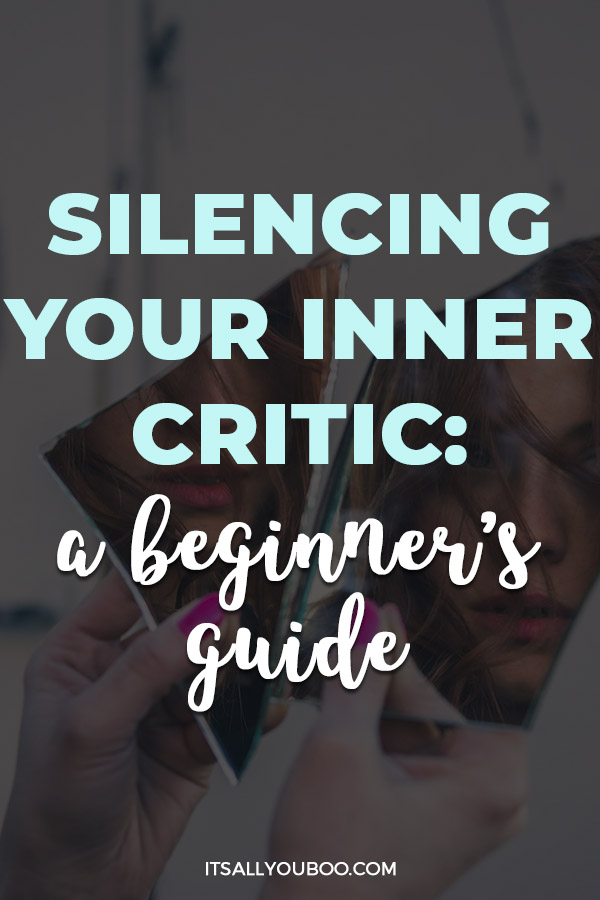
THIS POST MAY CONTAIN AFFILIATE LINKS.
IF YOU MAKE A PURCHASE FROM THESE LINKS, I MAY EARN A SMALL COMMISSION.
CLICK HERE FOR MY FULL DISCLAIMER STATEMENT.
What Does Your Inner Critic Say?
Before you set about silencing your inner critic, you should know what types of things it might be telling you. Here’s a shortlist of possibilities:
Inner Critic Examples
- “What will other people think?”
- “You’re stupid.”
- “Nobody likes you.”
- “That was a dumb thing to say.”
- “You’re making a fool of yourself.”
- “What’s wrong with you?”
- “You should never have been born.”
Just reading those words is probably churning up all sorts of other negative self-talk, so we won’t dwell. Know that silencing your inner critic is possible.
👉🏽 RELATED POST: How to be Comfortable with Yourself
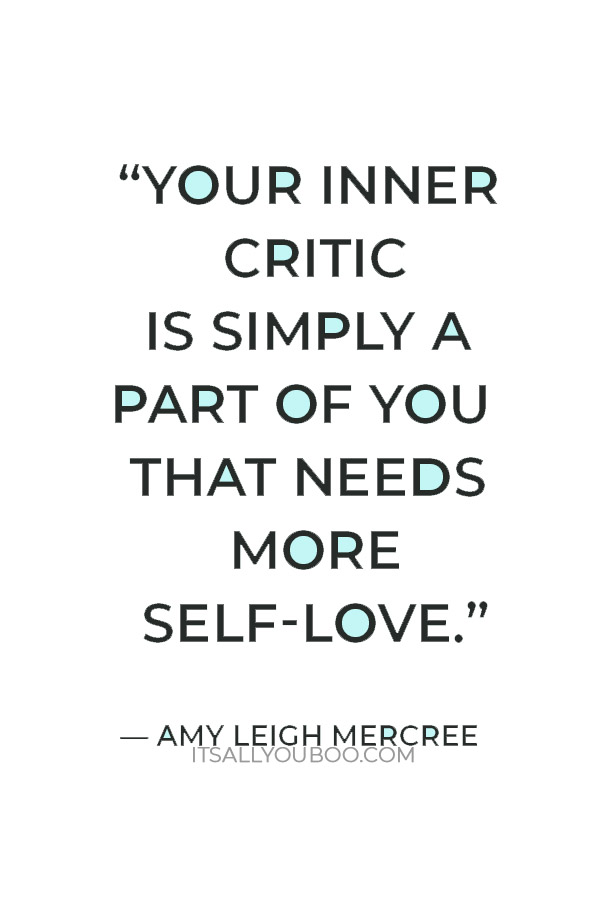
Where Does the Inner Critic Come From?
An important step to silencing your inner critic involves understanding how it came to be. The inner critic developed during your childhood. Your parents couldn’t be with you every moment, and so this internal voice evolved to help you navigate the world and to comply with its many complex requirements, expectations, and standards of behavior. The voice is sort of an internal parent, but this is not to say that your mom and dad are to blame.
The demands for acting a certain way come from many places besides parents, including teachers, friends, religious leaders, society, the media, and past experiences.
That said, for most people, parents are one of the strongest influences on behavior. If your family taught you either through words or actions that showing emotion is wrong, your inner critic absorbed that information. And it will continue to remind you of it in future high-stress situations. If your teachers made negative remarks about your schoolwork, your inner critic made a note that you must work harder next time.
Social media puts tremendous pressure on people to look a certain way. It also tells us that having particular material possessions is a sign of success. Thanks to technology, you now not only have to compare yourself with your immediate circle of friends but also anyone in the entire world. Talk about unnecessary stress.
👉🏽 RELATED POST: How to Stop Being Jealous Of Others
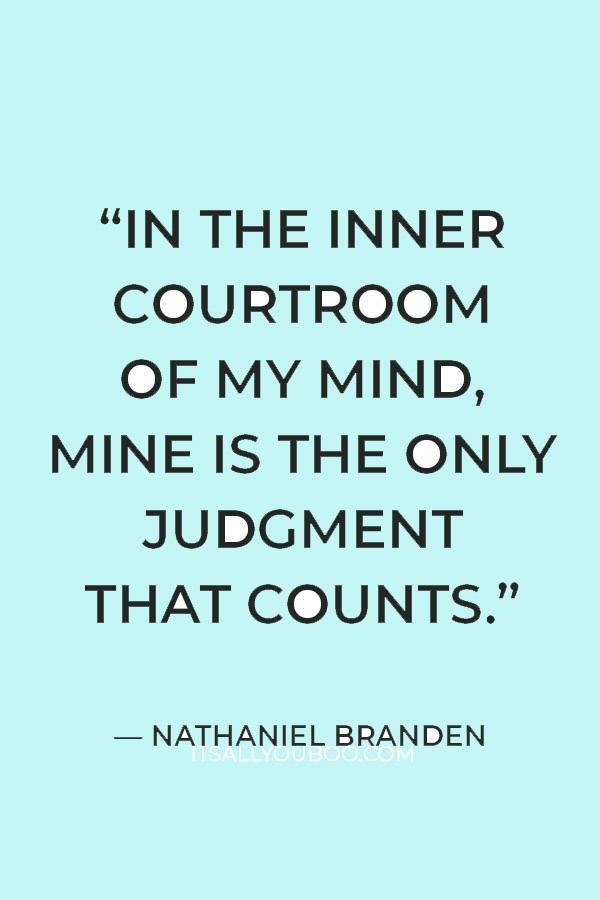
What Is the Purpose of the Inner Critic?
Believe it or not, your inner critic did not initially set out to ruin your life. At its origin, this inner voice was trying to help you to fit in and be accepted by others, correcting your behavior before anyone else has a chance to criticize or reject you. Its purpose is to assist you in better understanding the world.
The voice wants to protect you and save you from being shamed, hurt, or humiliated.
Uncertainty terrifies the inner critic. So it does everything it can to make sure you are accepted, protected, and loved. But when its power spins out of control, the price of conformity rises too high, and you can experience even more stress than you would have as an outsider.
Different Types of Inner Critics
Also essential to silencing your inner critic is understanding the different ways it tries to get you to conform you. As with most things, if you don’t know what you’re dealing with, it’s going to be hard to get results.
There are as many different inner critics as there are people on the planet, but they can be grouped into broad categories. Some people will have critics that match these types exactly, and others will have a mix.
See how many you recognize:
#1. The Conformist
The Conformist critic reminds you of the importance of fitting in. Its goal is to restrict your behavior to what is acceptable within your culture, both of your family and of the wider society. The Conformist appears when you don’t behave the way others expect, and it reminds you to do as you’re told, or risk being shunned.
👉🏽 RELATED POST: 50 Quotes About Being Criticized
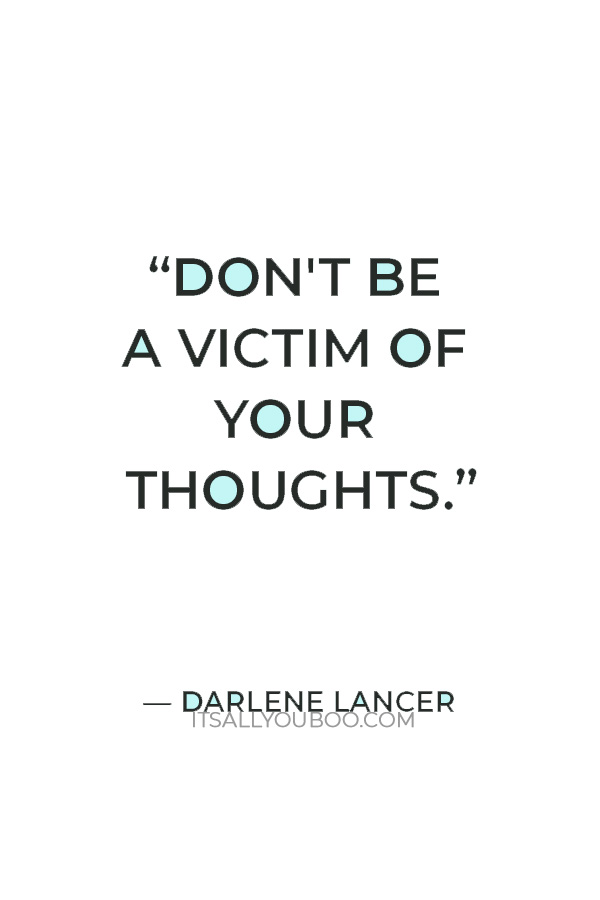
#2. The Underminer
The Underminer sabotages your confidence and self-esteem, paralyzing you and preventing you from trying something new. It makes you think success is impossible, so it’s pointless to even try.
#3. The Pleaser
The Pleaser voice puts others’ needs and wants before your own. You do as it says so that other people will like you and be nice to you. Putting yourself first is selfish, the Pleaser will tell you. A powerful Pleaser can make it very difficult for you to ever get around to enjoying or even exploring your own interests.
#4. The Guilt-Tripper
The Guilt-Tripping inner critic blames you for past decisions or actions you did (or didn’t) do. It gets especially loud if what you said or did was hurtful to other people, family, and friends in particular. The Guilt-Tripper cranks up the criticism even if the harm was unintentional. The Guilt-Tripper never lets you forget that you messed up, and makes you believe that the other person will never forgive you.
#5. The Taskmaster
The Taskmaster makes sure you work hard. Always. Relentlessly judging you, it battles with the Procrastinator, that part of you who’s looking to kick the job down the road. The Taskmaster tells you you’re lazy, weak, and that you’ll never accomplish anything unless you put in a lot of effort.
👉🏽 RELATED POST: How To Clear Limiting Beliefs
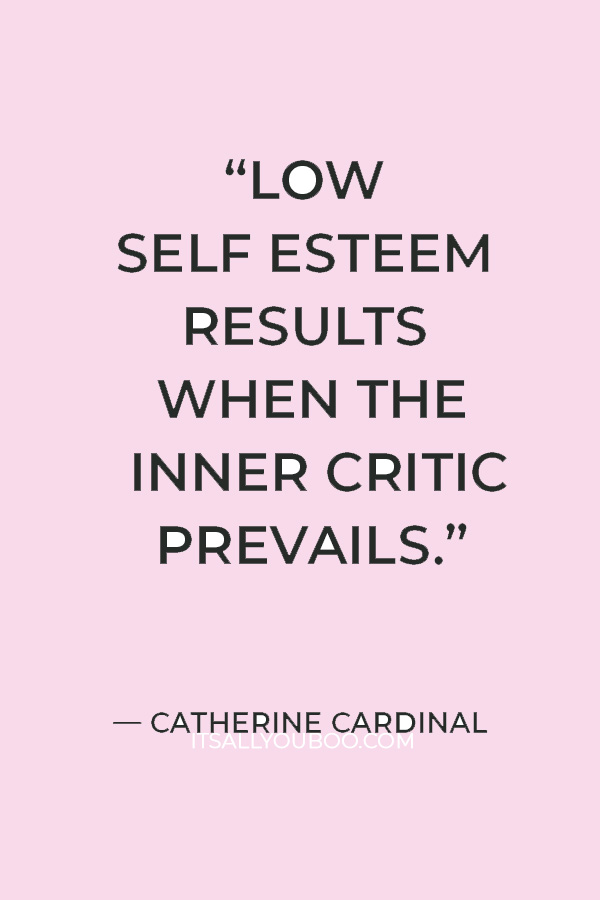
#6. The Perfectionist
The Perfectionist critic expects you to do everything flawlessly. Heaven help you if you don’t measure up to its impossibly high standards. Like the Underminer, the Perfectionist can prevent you from even trying out a new idea or project because it tells you you’ll never get it right.
#7. The Controller
The Controllers’ job is to take charge of impulses, including eating, drinking, smoking, gaming, or any other potentially addictive behavior. Your Controller zings you every time you slip up, telling you that you have no willpower and that you’ll never be able to change for the better.
#8. The Demolisher
The Demolisher directly attacks your self-esteem, shaming and reproaching you, not based on any particular thing you did or said, but just for being you. The Demolisher goes all out, telling you that you have no worth, and making you think your very existence is a waste.
Do We All Have an Inner Critic?
Short answer: Yes. Longer answer: The inner critic isn’t pure evil. As humans who depend on others to survive, we all fear rejection and disapproval of the tribe. Hence the inner critic who helps keep you in line. But like an overzealous secret agent who takes matters into his own hands, an out-of-control inner critic can create more trouble than it solves.
One way to check if your inner voice has gotten too powerful is to think about how it reacts when you do a good job. If all you feel is a tiny blip of relief at having dodged a bullet, your inner critic is too harsh. The overly critical self-censor doesn’t celebrate your successes, and it never lets you forget your slip-ups.
Excessive criticism can lead to anxiety and depression, which is why it is so important to work on silencing your inner critic.
👉🏽 RELATED POST: Stop Negative Self-Talk

How Do I Make My Inner Voice Shut Up?
Learning about where your internal voice comes from and what it’s for is all well and good, but let’s get to the good stuff: silencing your inner critic. If you’re fed up with your inner critic, take heart. You can definitely turn it down and even shut it off. All it takes is a little introspection, and some honest self-talk.
Let’s not forget, we actually owe a lot to our inner critic. It’s the internal drive that gets stuff done, and it has probably saved you from a fair amount of embarrassment. Like your parents, it helped you along during the early part of your life.
Your inner critic can help you zero in on weaknesses and areas to improve so that you succeed in school, work, relationships, and life.
3 Ways to Deal With Your Inner Critic
First of all, do not confuse your inner critic with yourself. You are separate, you can change and achieve, and you are worthy of acceptance and love. Second, know that no one ever lives up to the standards of their inner critic. The expectations simply aren’t realistic.
That said, you shouldn’t totally ignore your inner critic. Shutting out any part of your personality isn’t healthy. Accepting all aspects of yourself is the only way to live a complete, fulfilling life.
The best way to free yourself from your inner critic’s negative attitude is not so different from dealing with a real, live, difficult person you’re related to Talk to it, respectfully. The Golden Rule applies here.
Find out what it’s really trying to tell you. Remind it of its job, which is to protect you, not make you feel like a loser. The next time you goof and your inner critic starts up, counter with some positive self-talk.
Tell yourself, “Everyone makes mistakes.” Say it out loud if necessary. When you develop a healthier relationship with your inner judge, the voice switches to being a helpful supporter that can actually boost self-esteem and self-confidence because both you and it accept your flaws. When you both realize you’re on the same side, it’ll remind you that you are good enough as you are today, and it’ll help you achieve your goals and dreams.
👉🏽 RELATED POST: Let Go of Parents' Expectations
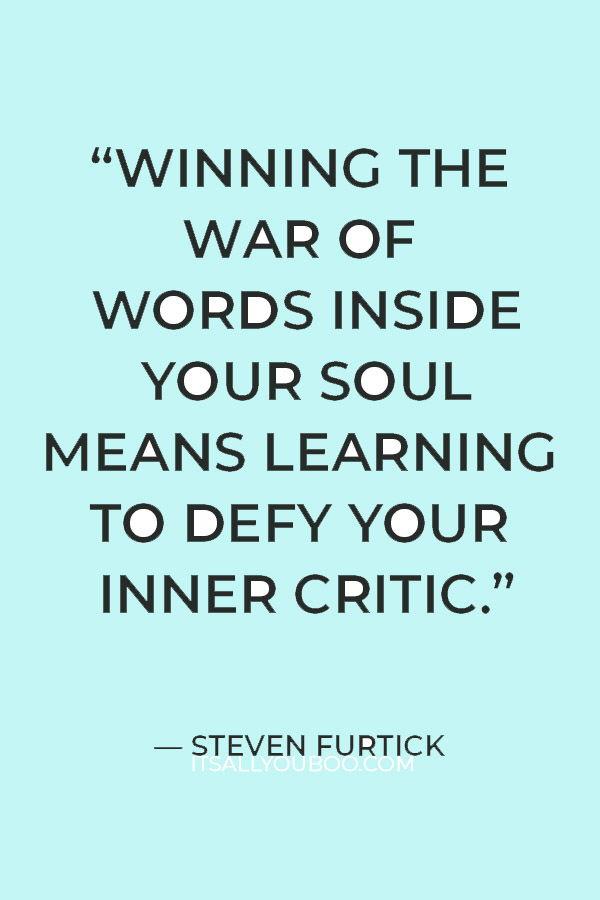
#1. Pay Attention
Rather than trying to shut your inner critic out, tune in. Give it a name if you like: Ego, Know-It-All, Judge Judy, whatever. Naming your critic separates it from you, returning some of your power.
As you go through the day, notice the different types of things your inner critic might be telling you:
Blame:
Does your inner critic condemn you for things you do (or don’t do)?
“This is all your fault.”
Impossible Standards:
Does your critic set unreasonable goals or expectations?
“Not perfect, go back to start. Or better yet, just quit.”
Comparisons
Does it compare your looks/achievements/possessions unfavorably to others?
“Why can’t you be more like her?”
Discouragement
Does the voice discourage you from trying?
“You’re going to fail.”
Admonishment
Does it remind you of past mistakes?
“You’ll never get it right.”
👉🏽 RELATED POST: Why Failure Is a Good Thing
Insults
Does the critic take potshots at you personally?
“You’re fat/ugly/stupid.”
Lucky Breaks
Does it discount good results?
“You got lucky.”
‘You Should…’
Does your inner critic tell you want you should have done?
“You shouldn’t be doing that.”
Shame
Does it tell you you’re just not good enough?
“No one will ever love you.”
If possible, track the times, places, and situations where your inner critic pops up. Does it start first thing in the morning when you’re looking in the mirror? When you’re doing certain activities? When you’re trying to fall asleep? You can even turn it into a game and keep tabs on repeat phrases or categories. Doing so can further help you reclaim your power and control over what you are willing to listen to, and what you can tune out.
👉🏽 RELATED POST: Retrain Your Subconscious Mind
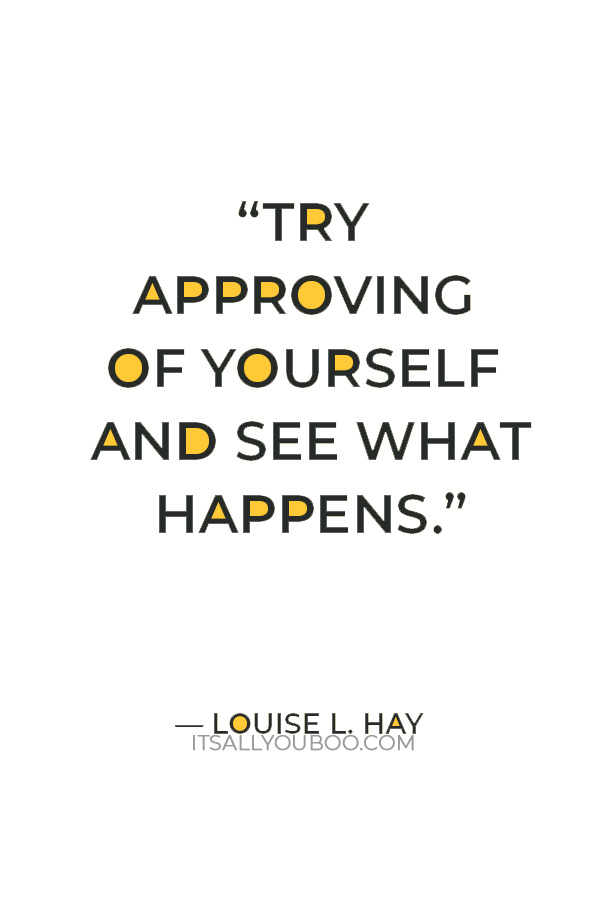
#2. Dig Deep
If you want to rid a garden of weeds, you have to do more than just snip them off. You’ve got to dig. This is true for silencing your inner critic as well.
These judgments come from others, so next time your critic starts yapping, think, who does this sound like? When do I first remember hearing this criticism? Reflect on the most common complaints your parents had about you. What would your friends say are the worst traits a person can have?
Understanding what is and is not acceptable to those closest to you will allow you to figure out when and where your inner critic is most likely to show up.
#3. Listen
After all this time we’ve spent talking about silencing your inner critic, you’re probably thinking, You must be kidding. Why should I listen to that jerk?! But as counterintuitive as it sounds, you need to listen so you can understand what it’s really trying to tell you.
We all want to be heard and understood; your inner critic is no different. If you can’t figure it out right away, keep asking, “What are you trying to tell me?” Be patient and it will become clear. The way to tame your inner critic is by validating its fears, no matter how strange they may sound.
Note: Whatever you do, don’t criticize the critic! That just makes it stronger. Show your inner critic how to behave by being kind and respectful yourself.
Positive More Positive Affirmations
Ready to start silencing your inner critic with positivity? Get your FREE 20 Printable Positive Affirmations to help you start thinking and living more positively today.
By understanding your inner critic’s fears and vulnerabilities, you are well on your way to becoming a stronger, happier, healthier person. Be patient with your inner critic, and yourself. New habits take time to form, and being stressed out is when your inner critic loves to shout. Keep working at it and you will get results.
You’re not a victim. You are worthy.
The great thing about self-improvement is that it’s never too late to start! You have a choice about how you live your life.

What’s your secret to silencing your inner critic?

More About Guest Contributor
Margaret Bell is a writer with The Pearl Source. When she’s not keeping up with the latest fashion developments in the world of e-commerce jewelry, she enjoys traveling, reading, and making music with friends. She believes in slower fashion and a more sustainable world moving forward!
Last Updated on February 25, 2025







Nadalie Bardo says
Thank you so much, Margaret for sharing your tips for silencing your inner critic. I know we could all do with hearing that nagging voice a whole lot less in our lives.
Megan says
I’m totally the pleaser. I, unfortunately, feel like I need people to like me. I love the idea of affirmations and focusing on my goals, regardless of what others think of me!
It's All You Boo says
Hi Megan,
I know a lot of people who are pleasers and sometimes it does go overboard that they forget to enjoy themselves. Thanks for reading this silencing your inner critic post!
Amber Myers says
I have been wanting to do more affirmations. I can be pretty cruel to myself at times and I need to stop it.
It's All You Boo says
Hi Amber,
Don’t be too cruel! 🙂 It’s never too late to start improving and silencing your inner critic. Thanks for reading!
LOURAINE WILMOT says
Your inner critic can also be your motivator. It never leaves you, It will give you a bit of a nudge when you are off target. Thanks.
It's All You Boo says
Hi Louraine,
You are correct, your inner critic is not always that bad until it overpowers you.
Jen @ JENRON DESIGNS says
I think we are all our own worst critics I know I am, this is so helpful. Thank you.
It's All You Boo says
Hi Jen,
I’m glad you find this silencing your inner critic post helpful. Share away if you can/want. Thanks for reading!
Nicz Escat says
These are all really great and very helpful tips! Thank you for sharing this to us!
It's All You Boo says
Hi Nicz,
Glad that you find this silencing your inner critic post helpful! Thanks for dropping by!
Janeane Davis says
Many people allow their inner critic to keep them from doing all kinds of wonderful things. this article will help prevent a lot of that.
It's All You Boo says
Hi Janeane,
True, if you let your inner critic rule over you it will limit you in achieving your goal and success. Thanks for reading this silencing your inner critic post!
Melissa Cushing says
Love this post and I am going to work on silencing my inner critic. It is and has always been an issue for me for sure.
It's All You Boo says
Hi Melissa,
Go girl! You can do it! I hope this post will help you in silencing your inner critic!
Tisha says
It is so hard to silence that inter critic. But these are great tips
It's All You Boo says
Hi Tisha,
Slowly and with practice you will be able to silencing your inner critic for sure! I’m glad you find this post helpful!